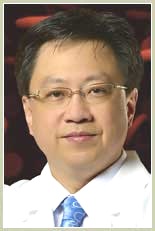
Title:Molecular Medicine: New Paradigms for Faster-to-Market Drug Development and Image-Guided Therapy
报告人: 史蒂芬•王,康奈尔大学威尔医学院卫斯理医院研究中心系统医学和生物工程系
Speaker: Stephen Wong, PhD, PE , Systems Medicine and Bioengineering Department, The Methodist Hospital Research Institute, Weill Medical College, Cornell University
时间:2011年7月13日9:30-11:00 Time: AM 9:30-11:00, July 13, 2011
地点:武汉光电国家实验室(筹)A301 Venue:Room A101, WNLO
报告人简介:
史蒂芬•王博士是康奈尔大学威尔医学院卫斯理医院研究中心系统医学和生物工程系的创建人。作为生物医学工程中心的主任及John S. Dunn, Sr.讲座教授,他同时是放射系,病理系,实验医学系,神经科学系的兼职教授。王博士是卫斯理医院癌症研究中心实践研究主任,同时也是康奈尔大学威尔医学院卫斯理医院在医学物理和医学信息学方面的负责人。王博士同时也是Chao氏基金会BRAIN研究中心(神经科学生物信息及成像研究中心)及美国国立卫生研究院癌症研究所癌症发展建模中心的创建人及主任。
作为一位具有较高国际知名度的计算机、成像及系统生物学专家,王博士曾经领导研发了第一台喷墨打印机自动化生产,第一个超大规模集成电路1MB计算机内存芯片,当时最大的在线证券交易系统,及所有美国医学学术中心中第一个全医院范围内的数字放射影像管理系统。这个系统使全世界的医院和医生远程读取病人的医学图像记录得以实现。在加入卫斯理医院之前,王博士曾就职于哈佛大学医学院神经退化及修复中心。在那里他创建了哈佛大学校内生物信息中心。王博士同时在哈佛大学医学附属布莱根妇女医院作兼职教授,并创建了功能及分子成像中心。王博士在工业界及医学界有超过20年的研发经历,他曾经就职于惠普,AT&T贝尔实验室,日本第五代计算机研发组,飞利浦电子,Charles Schwab公司,加利福尼亚大学三藩医学院,哈佛大学医学院。王教授曾就读于麻省理工斯隆商学院,史坦福大学商学院,哥伦比亚大学商学院并接受了高级行政管理方面的教育。
Biography:
Dr. Stephen TC Wong is the Founding Chairman for Department of Systems Medicine and Bioengineering, The Methodist Hospital Research Institute and Weill Cornell Medical College. He holds the John S. Dunn, Sr. Distinguished Endowed Chair in Biomedical Engineering; he is also a Professor of Radiology, Pathology, Laboratory Medicine, Neurology, and Neurosciences, the Director of Translational Research at Methodist Cancer Center, and Chief of Medical Physics and Chief Research Information Officer at The Methodist Hospital, Weill Cornell Medical College. In addition, he serves as the Founding Director of the Ting Tsung and Wei Fong Chao Center for BRAIN (Bioinformatics Research and Imaging in the Neurosciences) and Founding Director of the NCI Center for Modeling Cancer Development at The Methodist Hospital Research Institute.
An internationally acclaimed imaging scientist and systems biologist, Dr. Stephen Wong has led teams that developed automation for the production of first inkjet printer and the first very large scale integration (VLSI) 1MB computer memory chip, the largest online brokerage trading system, and the first hospital-wide digital radiology image management system in US academic medical centers, used by hospitals and physicians throughout the world to electronically access patient image medical records. Before accepting his current position with Methodist, Dr. Wong held posts with the Harvard Center of Neurodegeneration and Repair at Harvard Medical School, where he established the Harvard-wide Center for Bioinformatics; Brigham and Women’s Hospital, where he founded the Functional and Molecular Imaging Center. He has more than two decades of research experience in industry and hospitals, including Hewlett-Packard, AT&T Bell Laboratories, the Japanese Fifth Generation Computer Systems Project, Royal Philips Electronics, Charles Schwab, University of California - San Francisco School of Medicine, and Harvard Medical School. He received his senior executive education from the MIT Sloan School of Management, Stanford University Graduate School of Business, and Columbia University Graduate School of Business.
报告摘要:成功绘制人类基因组图谱是新千年以来的一项伟大成就。它使我们意识到一个分子医学的新纪元正向我们开启。这次讲座将介绍一些最新的应用分子医学来加快药物研发的范式,分子图像引导介入治疗,以及我们实验室如何将这些方法转为低成本的实用的疾病治理技术。
讲座的第一部分将描述如何利用系统生物建模及高通量生物科技来实现一种更快更经济的药物重定位方法。低效率及庞大的花费是药物发展研究的主要难题。目前一种新药的产生平均需要花费10-17年及上十亿美元。这里将讨论如何发现针对肿瘤复发的治疗剂及相应的系统生物学策略。为了使研究成果更快的实用化,我们的策略是将已知药物重定位,使其能抑制肿瘤干细胞(CSCs)或肿瘤初始细胞(TICs)的再生。基于上述的模型框架,我们能快速地发现假说并利用高通量技术加以验证。
讲座的第二部分将讨论分子医学在手术介入治疗中的另一项革新应用。图像引导治疗(IGT)的概念最早于30年前提出的。其目的是通过提供术前及术中图像信息,来提高微创手术的效率及减少病症。随着技术的不断发展,IGT与多模态成像,机器人,图像处理及计算机视觉等技术紧密地结合在一起。这里我们将展示一种全新的方式,能有效结合基因及分子功能成像,宏观医学成像及分子显微成像,特别是无需染色的生物光子学技术,使我们能够视觉化活体内细胞和分子并检测疾病状态。这将引入一种新的途径来设计及实现分子图像引导治疗系统,而不是通过简单的手术步骤改动来实现早期发现及个体化用药。
Abstract: Successful mapping of the human genome is a significant scientific landmark in the beginning of the new millennium. With it comes the realization that the era of molecular medicine is upon us. This talk introduces new paradigms of molecular medicine for faster-to-market drug development and molecular image-guided intervention, and our group’s efforts of translating them into practical and cost-effective technology for disease management.
The first part of the talk describes a faster and cheaper way to find or reposition drugs using systems biology modeling and high throughput biotechnologies. Drug development today is burdened with inefficiency and costs. Currently it takes about 10-17 years and over a billion dollar to develop a new drug. This lecture discusses how to discover therapeutic agents and systems biology strategies that target cancer and tumor relapse. To achieve faster translational impact, our strategy is to reposition known drugs to inhibit the self-renew of cancer stem cells (CSCs) or tumor initiating cells (TICs). Hypotheses can be rapidly generated in our modeling framework and validated with high throughput technologies.
The second part covers another revolution of molecular medicine in the surgical intervention. The development of image guided therapy (IGT), started about three decades ago, aims to improve the efficacy of minimally invasive procedures and to reduce morbidity by providing pre-operative and direct intra-operative image based information. Since then IGT has been integrating multimodality imaging, robotics, and image processing and visualization but the principle of operation largely relying upon morphologic information. Here we present a new approach that ties functional genomics and molecular imaging together, and integrate macroscopic medical imaging with microscopic molecular imaging, especially label free biophotonics techniques, in detecting and visualizing disease state at molecular and cellular levels in vivo, leading to a new way to design and implement molecular image-guided therapy systems beyond incremental improvement of surgical procedures and achieve early detection and personalized medicine.